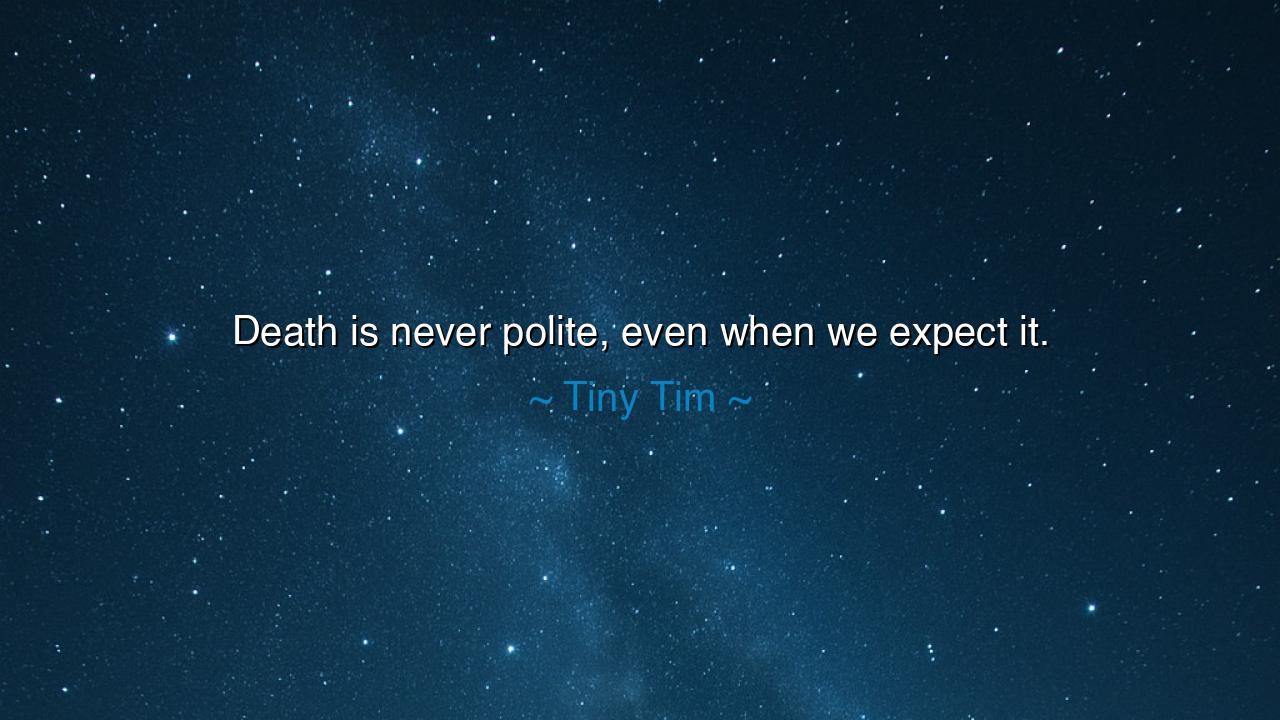
Death is never polite, even when we expect it.






When Tiny Tim said, “Death is never polite, even when we expect it,” he spoke with the quiet wisdom of one who had looked into the face of mortality and understood its truth. His words, though simple, strike with the weight of eternity — for they remind us that death, no matter how long we prepare for it, always arrives as an intruder. It knocks not with gentleness, but with inevitability; it does not ask permission, nor bow to ceremony. Whether it comes in youth or in age, in silence or in storm, it is always abrupt to those who love and are loved. To call death “never polite” is to say that it cannot be softened by ritual or reason. It strips us bare of illusion, leaving only what is real — the love we gave, the life we lived, and the time that is no more.
The origin of this quote lies in the strange and poignant life of Tiny Tim — the gentle musician known for his falsetto voice and eccentric charm. Behind his childlike manner was a man deeply aware of life’s fragility. Plagued by heart trouble, he lived with the shadow of death ever near, yet he refused to let it silence his joy. When he spoke these words, he was expressing what he had seen and felt: that even when one knows death is coming — even when the doctors warn, even when the body grows frail — it still arrives with a kind of violence, tearing the fabric of life with no regard for timing or grace. In this, Tiny Tim voiced the same truth that poets and philosophers have wrestled with for centuries — that mortality is the great equalizer, the force that humbles all human pride.
The meaning of this quote lies not in despair, but in acceptance. To say that death is never polite is to acknowledge that it does not conform to human comfort. We may prepare ourselves with faith, with courage, with ritual — but when it comes, it comes as it must: sudden, final, and indifferent to our readiness. Yet in this lack of politeness, there is a hidden mercy — for death’s power reminds us to live honestly and urgently. Its rudeness awakens us to the truth that life is not infinite, that each moment is precious because it ends. In recognizing the harshness of death, we learn to cherish the gentleness of life — the laughter of friends, the warmth of morning light, the tenderness of love freely given.
This wisdom is mirrored in the story of Socrates, the philosopher who faced death with calmness and reason. When condemned to die by poison, he did not rage against fate, but accepted it as part of the natural order. Yet even he, who had spent a lifetime pondering mortality, confessed to his students that the moment of separation — the crossing from life to death — was beyond understanding. He expected death, but still found it mysterious. In that moment, he learned what Tiny Tim would later express: that even for the prepared, death is never gentle, for it takes what cannot be fully surrendered — the living self.
Consider also the story of Abraham Lincoln, whose death shook a nation even though danger always shadowed him. He had dreamed of his own assassination days before it happened, had spoken of it openly, and yet when the fatal moment came at Ford’s Theatre, it struck with all the force of tragedy. The nation expected danger but was still undone by loss. Death, even when foreseen, has this power: it tears open the heart, showing us how deep our attachments run. Lincoln’s passing, like that of all great souls, reminds us that no one — however wise or noble — can greet death as a courteous guest. It always disrupts, always demands, always transforms.
In calling death “impolite,” Tiny Tim also reveals the human need for dignity in the face of the inevitable. We dress death in ceremony — funerals, prayers, flowers — to make it gentler, to tame its wildness. Yet beneath the ritual lies the raw truth: death does not bow to our customs. It does not wait until our affairs are settled, nor does it honor our schedule. It comes as it wills, and in that unpredictability, it teaches us humility. The only way to meet its impoliteness is with grace — to live in such a way that when it interrupts, our hearts are ready, not because we conquered it, but because we embraced life fully until the last breath.
So take this lesson, child of dust and spirit: do not curse the impoliteness of death, for it is the mirror of life’s urgency. Know that every sunrise you see, every face you love, every heartbeat you feel is a gift borrowed from eternity. Live so that when death arrives — unannounced, ungracious, uninvited — it finds you awake, not asleep in distraction. Forgive quickly, speak kindly, give freely, and create beauty wherever you can. For though death is never polite, it can be met with dignity, by those who have learned to greet each moment as sacred. And when your own time comes, let it find you not clinging in fear, but standing as one who has lived deeply — ready to bow, to release, and to return to the silence from which all songs are born.






AAdministratorAdministrator
Welcome, honored guests. Please leave a comment, we will respond soon